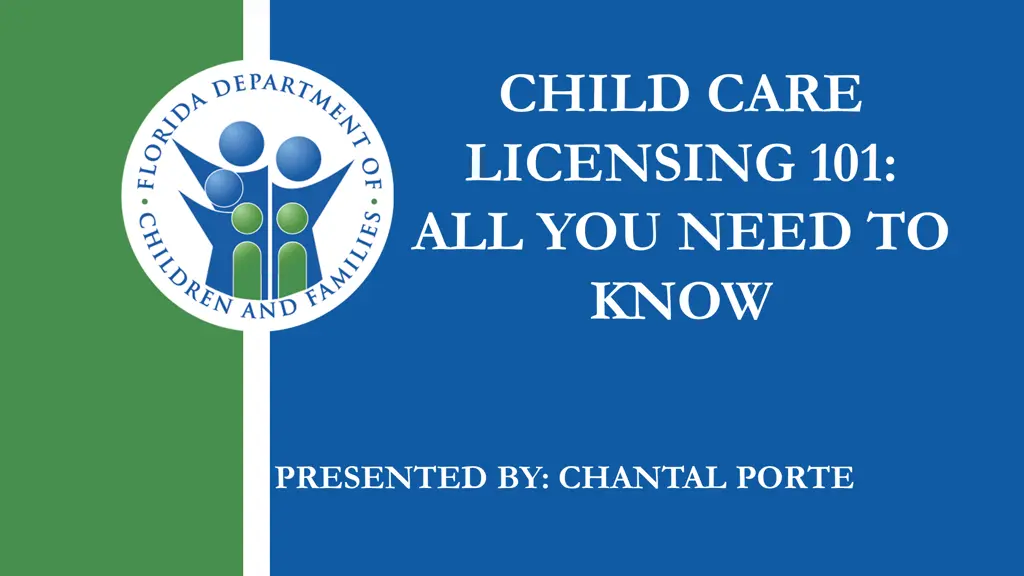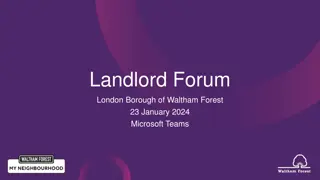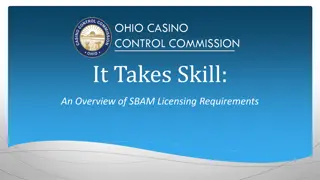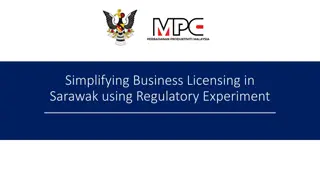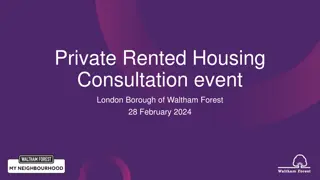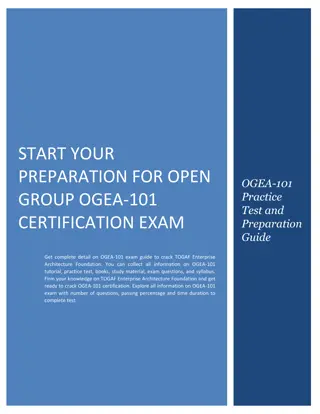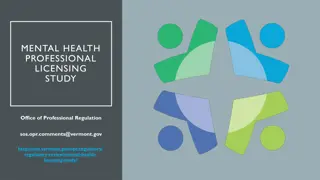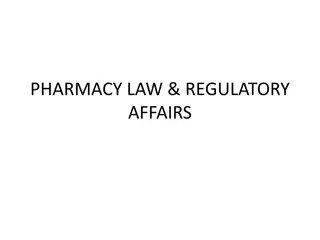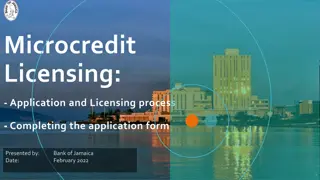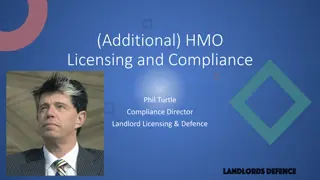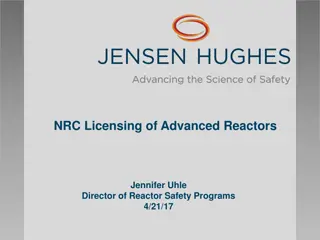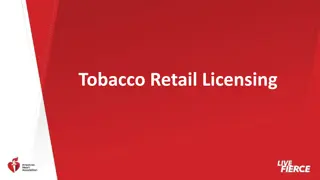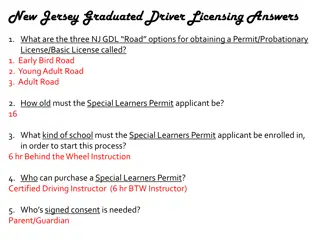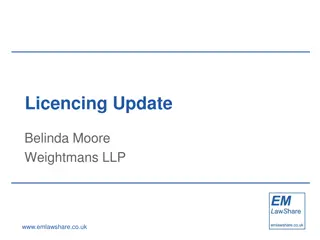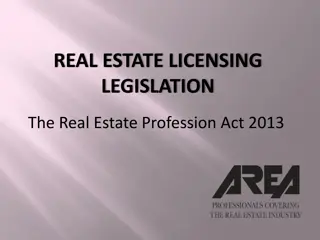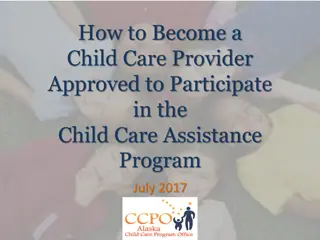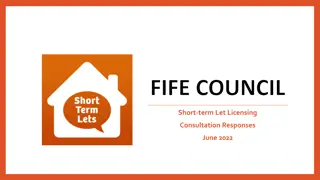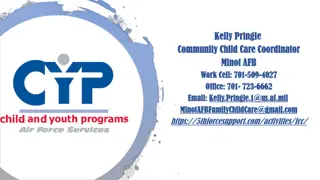Child Care Licensing 101: All You Need to Know
Gain a clear understanding of child care licensing standards and how they shape daily operations. Learn about regulatory expectations and how they align with protecting the health and safety of children in child care programs.
Download Presentation

Please find below an Image/Link to download the presentation.
The content on the website is provided AS IS for your information and personal use only. It may not be sold, licensed, or shared on other websites without obtaining consent from the author.If you encounter any issues during the download, it is possible that the publisher has removed the file from their server.
You are allowed to download the files provided on this website for personal or commercial use, subject to the condition that they are used lawfully. All files are the property of their respective owners.
The content on the website is provided AS IS for your information and personal use only. It may not be sold, licensed, or shared on other websites without obtaining consent from the author.
E N D
Presentation Transcript
CHILD CARE LICENSING 101: ALL YOU NEED TO KNOW PRESENTED BY: CHANTAL PORTE
LEARNING OBJECTIVES Recognize how the Florida Statutes, Florida Administrative Code, and the Handbook align to protect the health and safety of children in Child Care Programs Statewide Understand and differentiate how licensing standards shape the daily operations of a Child Care Program Gain a clear and cohesive understanding of Regulatory Expectations as outlined by DCF and disseminated to Providers. 2
LEGISLATIVE INTENT 402.26(3), FLORIDA STATUTES To protect the health and welfare of children, it is the intent of the Legislature to develop a regulatory framework that promotes the growth and stability of the child care industry and facilitates the safe physical, intellectual, motor, and social development of the child.
CHILD CARE DEFINITITION Section 402.302(1), F.S., defines child care as follows: Child care means the care, protection, and supervision of a child, for a period of less than 24 hours a day on a regular basis, which supplements parental care, enrichment, and health supervision for the child, in accordance with his individual needs, for which a payment, fee, or grant is made for care. If all of the elements are not met, including payment, fee, or grant, then the definition of child care is not met and there is no licensing authority regardless of the ages of the children. In determining "payment" or "fee", a once per year nominal charge would not be considered a payment or fee for the purposes of determining whether or not the definition of child care has been met. 4
CHILD CARE DEFINITION CONTD. In terms of a grant, if a program received a state, federal, or foundation grant award to operate a program, that would meet the definition and licensing would be required. If a city or county operated a recreational center as a part of its normal operation and did not charge a payment or fee, the child care definition would not be met and there would be no licensing authority. It is our policy to look at every program individually to determine licensure status. What a program may choose to call itself, or where it may be located, does not necessarily exclude it from, nor include it in, licensure. It is our responsibility to provide technical assistance to any program to help them understand why their program is, or is not, defined as child care. 5
LICENSURE REQUIREMENTS Every program determined to be subject to licensing must meet the applicable licensing standards established by 402.301-.319, F.S., and rules adopted there under. 6
FLORIDA STATUTES 402.305(1): LICENSING STANDARDS. The department shall establish licensing standards that each licensed child care facility must meet regardless of the origin or source of the fees used to operate the facility or the type of children served by the facility. (a) The standards shall be designed to address the following areas: 1. The health, sanitation, safety, and adequate physical surroundings for all children in child care. 2. The health and nutrition of all children in child care. 3. The child development needs of all children in child care. 402.313(13): The Department shall, by rule, establish minimum standards for family day care homes that are required to be licensed by county licensing ordinance or county licensing resolution or that voluntarily choose to be licensed. The standards should include requirements for staffing, training, maintenance of immunization records, minimum health and safety standards, reduced standards for the regulation of child care during evening hours by municipalities and counties, and enforcement of standards. 402.3131(7): The department shall, by rule, establish minimum standards for large family child care homes. The standards shall include, at a minimum, requirements for staffing, maintenance of immunization records, minimum health standards, minimum safety standards, minimum square footage, and enforcement of standards. 7
FLORIDA ADMINISTRATIVE CODE 65C-22.001(6) Child Care Standards. Child care programs must follow the standards found in the Child Care Facility Handbook, October 2021, incorporated herein by reference. 65C-20.008(7) Family Day Care Home and Large Family Child Care Home Standards. Family Day Care Homes and Large Family Child Care Homes must follow the standards found in the Family Day Care Home and Large Family Child Care Home Handbook, October 2021, incorporated herein by reference. 8
CHILD CARE LICENSING WEBSITE For detailed information on the laws and requirements that govern the operation of facilities and homes within the state of Florida, visit the Child Care Laws and Requirements page of the Department s website at www.myflfamilies.com/services/child- family/child-care/child-care-laws-and- requirements 11
PARTNERING STATE AGENCIES State Fire Marshall Focuses on the protection of life, property, and the environment. Department of Children and Families Background Screening (BGS) Clearinghouse Provides a point of contact for BGS results. Florida Department of Law Enforcement Processes child care personnel criminal history records checks statewide and national and juvenile checks. Florida Division of Early Learning Administers the School Readiness (SR) and Voluntary Prekindergarten (VPK) programs. Florida Department of Health Conducts health record audits. Local County Government Agencies Includes Zoning and Building Administration and the four counties that require homes to be locally licensed. 12
LICENSING VIOLATIONS? Violation is a noncompliance with a licensing standard as described in an inspection report resulting from an inspection under Section 402.311, F.S., as follows with regard to Class I, Class II, and Class III Violations. 13
ENFORCEMENT Technical Assistance - Provided to each child care provider found to be noncompliant with one or more licensing standards. Can include recommendations to the provider on how to comply with licensing standards. Corrective Action Required for all licensing standards cited for noncompliance and may include corrective action requirements, task(s) and due dates to meet the minimum licensing standards. Administrative Fine A disciplinary sanction based on the number of occurrences and the Classification Level of licensing standard violations, which occur over a two-year period, as defined in Chapters 65C-22.010(2) and 65C-20.012(3), F.A.C. 14
Initial Inspection Routine Inspection Abbreviated Inspection CHILD CARE INSPECTIONS Re-inspection Renewal Inspection Complaint Inspection School Readiness Inspection Gold Seal Inspection
FREQUENCY OF INSPECTIONS CCF - Three full, on-site, inspections per year, approximately every four months. If applicable, an abbreviated inspection can replace a full routine inspection. FDCH/LFCCH - 2 full, on-site inspection per year, approximately every 6 months. If applicable, an abbreviated inspection can replace a full routine inspection. Exceptions - Inactive providers. Programs that operate less than 12 months a year (school-year only). Probation status.
RIGHT OF INSPECTION 402.311, F.S. Every child care provider is required to allow the Department access to facilities, personnel, and records at reasonable times, during regular business hours, to ensure compliance with Section 402.301 through 402.319,F.S.
HELPFUL HINTS All child care providers are required to keep current, well-organized, and up-to-date files, postings, written policies, records, and other documentation for children in care, employees, and their own child care program. Each of the records required must be maintained at the program location and must be available during the hours of operation for review by the licensing authority. Copies of required records are acceptable for documentation. Original documents are the property of the party providing the information. Electronic records are acceptable for documentation as long as the records are available and accessible for review by licensing authority during an inspection. 19
PERSONNEL RECORDS Child Care Training Transcript Background Screening and Personnel Requirements Form [CF- FSP 5131] Child Abuse and Neglect Reporting Requirements Form [CF-FSP 5337] Attestation of Good Moral Character [CF-FSP 1649A] Application for Employment with Supplemental Statements Level II Background Screening Employment History and Verification Documented proof of fire extinguisher training Documented proof of Universal Precautions/Exposure Plan training Documented proof of safe sleep practices and shaken baby syndrome training* Documented proof of CPR/First Aid training* Documented proof of medication administration training* Documented proof of transportation training* Child Care In-Service Training Record [CF-FSP 5628] *If applicable to the program 20
CHILDRENS RECORDS Child Care Application for Enrollment Form [CF-FSP 5219] or equivalent o Signed custodial parent/legal guardian statement(s) acknowledging receipt of the program s disciplinary and expulsion policies o Signed custodial parent/legal guardian statements acknowledging receipt of the Department's child care facility brochure, "Know Your Child Care Facility," [CF/PI 175-24] or the Department s family day care home brochure, Selecting A Family Day Care Home Provider [CF/PI 175-28] Current Student Health Examination Certificate 21
CHILDRENS FILES CONTD.. Current Florida Certificate of Immunization Florida SHOTS Schools & Child Care Centers Influenza Brochure Distracted Adult Brochure Medication Administration Form (When Applicable) Accident/Incident Reporting Form (When Applicable) Food Related Activities Form (When Applicable) 22
INFLUENZA & DISTRACTED ADULT BROCHURE 23
TRAINING REQUIREMENTS Mandatory Introductory Training Safe Sleep/Shaken Baby Syndrome Training Early Literacy Training First Aid and Cardiopulmonary Resuscitation (CPR) Certification Universal Safety Precautions Training Fire Extinguisher Training Transportation Training Medication Training Annual In-Service Training 24
TRENDING VIOLATIONS 1. 2. 3. 4. 5. 1. 2. 3. 4. 5. Overall, Supervision & Ratio are the resounding top 2 alleged violations across the board. Since we started the log in October 2022, there have been 824 complaints logged w/ follow-up including both online and from the regions inputting. The top alleged violations of complaint are: Supervision 127 Ratio 114 General Health & Safety 86 Illegal Operation 70 Abuse & Neglect 64 Supervision & Ratio account for almost 30% of all logged complaints since October 2022. For 2023 alone the out of 337 logged complaints, the top alleged violations are: Supervision 66 Ratio 52 Access/Child Safety 30 Abuse/Neglect 28 General Health & Safety 27 Supervision & Ratio account for 35% of all logged complaints for 2023. 1. 2. 3. 4. 5. 1. 2. 3. 4. 5. 26 *Southern and Suncoast have not utilized the complaint log frequently. Much of this data is based on Central, NE, NW & online complaints received. ONLINE COMPLAINTS ONLY INFO: Out of 940 Online Complaints for FY 22-23, the top alleged violations are: Ratio - 273 Supervision - 255 Accident/Incident - 132 Illegal Operation - 105 Discipline 95 Supervision & Ratio account for 56% of all logged complaints for FY 22-23. Of 269 logged Online Complaints for 2023, the top alleged violations are: Supervision 71 Ratio 65 Accident/Incident - 35 Discipline - 27 Illegal Operation 26 Supervision & Ratio account for almost 51% of all logged online complaints for 2023.
TECHNICAL ASSISTANCE VS. HEALTH & SAFETY Technical Assistance Flexibility Resources Provided One-on-One & Group Trainings Healthy & Safety Non-negotiable TA still Provided & Notated (Always) 27
ONLINE APPLICATIONS & RESOURCES About Child Care Licensure | Florida DCF (myflfamilies.com) 28
QUESTIONS? 29
Licensing Staff Regional Manager chantal.porte@myflfamilies.com
